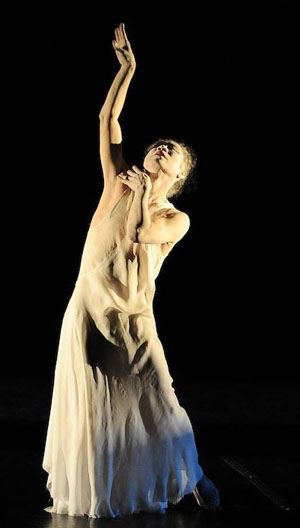Sounds of Europe
The four-day festival of new music that was part of the Book Arsenal fair was a non-standard event
Large book fairs are usually accompanied with a music program which largely involves such popular genres as rock and jazz. This time around, though, the program was fully devoted to the academic avant-garde, i.e., music which does not belong to the repertoire of even the National Philharmonic Society and can rarely be heard in Kyiv, except for, perhaps, festival reviews held by official organizations of composers. Now the Ukho agency made a valuable contribution to the typical music calendar.
The opening notes of the festival were struck by the British-French chamber ensemble Octandre – Joseph Houston (piano), Corentin Chassard (cello), and Noemi Gyori (flute). The program “Other Voices” had a distinctly metaphysical and even meditative character: Luciano Berio’s Sequenza I for flute (1958), Morton Feldman’s Intermission 6 (1953), Christian Mason’s Incandescence (2011), John Cage’s famous and provocative 4’33’’, Kaija Saariaho’s Mirrors (1997) and George Crumb’s Vox Balaenae (1971).
Lydia Kavina (Russia-Great Britain) stood out through her emphasis on technological exotics. She played the theremin which may be the world’s first electronic musical instrument – it was invented by Russian scientist Leon Theremin in 1918. The contactless playing technique alone turns a concert into a special spectacle, even more so that the sound of this wondrous instrument is charming in its own special way.
The performances of Roman Yusipey (Ukraine) are always interesting primarily because he reveals the true capabilities of his instrument, the bayan, by playing the most striking pieces by contemporary composers. This time his concert “Re-pulse” consisted of Luciano Berio’s Sequenza XIII (1955), Maksym Kolomiiets’s vivid and expressive play Re-pulse for oboe and bayan (2012, premiere), Bohdan Sehin’s melancholy And, Like Sailors, Relishing the Sight of Land (2011, based on Homer’s Iliad), Sofia Gubaidulina’s deeply dramatic De profundis (1978), Null with its exquisite lace of closed structures by noted Kyiv-based composer Viktoria Poliova (2005), John Cage’s Melodies (1950), the Alexandra Filonenko’s poignant Schattenspiel (2011) and, finally, the light and light-hearted Suite made up of music for theater and cinema by Giya Kancheli (2012, premiere). The soiree of Mariana Sadovska (Ukraine-Germany), who played Russian music, including prison music, and songs by Alexander Vertinsky and Dina Vierny, drew the attention of numerous music buffs.
Two landmark concerts were the drawing card of the New Music Festival. Valentyn Sylvestrov, a living classic of Ukrainian academic music, marked his 75th anniversary this year and presented his famous Steps (1989-92/1997), which is a vocal series based on poetry by Alexander Blok, Osip Mandelshtam, Fyodor Sologub, Fyodor Tyutchev, Yevgeny Baratynsky, John Keats and Alexander Pushkin. The series was performed by Olha Zasadna (soprano), Volodymyr Lavrynenko (piano) and Kirill Zvegintsov (piano). Sylvestrov’s gifted student, Viktoria Poliova, recently celebrated her 50th birthday and also had a nice present in the form of a concert: the audience saw Tadashi Endo, a famous Japanese butoh dancer, perform Poliova’s Gagaku ballet. Her contrastive, tragic music was an event in its own right independently from the accompanying imagery.
In just four days, the enthusiasts from the Ukho agency treated the audience to a high-level overview of contemporary music in all its manifestations, from tragic to extravagant, and thus undermined the monopoly of government organizations. There was a capacity crowd at every concert. Sometimes there were even extra listeners despite the fact that admission was not free (unlike at most concerts organized by official unions). This proves that there are people in Kyiv who can organize academic concerts at a high level and those who are interested in it, which speaks more about the European character of our capital than any declarative statements and opinion polls.






